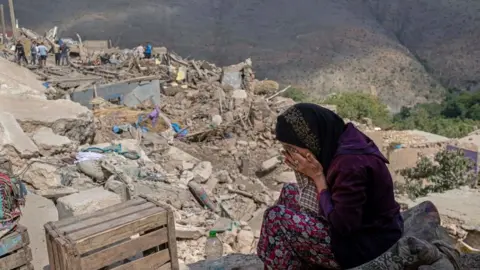Morocco town holds protest to demand aid weeks after earthquake
 AFP
AFPHundreds of residents of the Moroccan town of Amizmiz have protested against local authorities, weeks after a deadly earthquake destroyed their homes.
Amizmiz, located 34 miles (55km) south of Marrakesh, was one of the hardest-hit by the 8 September earthquake.
It was the worst to strike Morocco in more than 60 years, killing nearly 3,000 people and leaving thousands more injured and homeless.
The residents accuse local authorities of delaying aid and neglecting them.
Following the earthquake, authorities put up displaced families in tented camps, accompanied by a promise of financial assistance to help rebuild their homes.
But the protesters now say they cannot continue living in the camps as conditions are deteriorating, with heavy rains and winds hitting the region and temperatures dropping as winter approaches.
The protesters also accuse local authorities of withholding assistance, including tents, from some of the residents who lost their homes.
The protest went ahead on Tuesday despite the withdrawal of the Amizmiz Earthquake Victims' Co-ordination group, which had organised the protest.
The group said they had pulled out after local authorities promised to address their concerns.
They said that the authorities had promised to speed up assistance, including providing new tents to those who had not previously been given any, and those whose tents had been damaged by the harsh weather.
They also pledged to improve sanitation at the camps and provide the displaced with access to water and electricity.
Morocco's King Mohammed VI last month announced 120bn Moroccan dirhams ($11.6bn; £9.4bn) over five years to rebuild the regions impacted by the earthquake and support the more than 4.2 million affected people.
The plan includes a pledge to grant 140,000 dirhams in reconstruction aid to each household with a collapsed home and 80,000 for each household whose home was partially damaged.
Earlier this month, the government said it had started disbursing 2,500 dirhams in monthly assistance to each affected household, as part of a year-long cash relief program.
Morocco's government faced criticism from some citizens in the aftermath of the earthquake after it turned down some offers of international aid, despite thousands desperately needing urgent assistance.
"I think it is really an error [to insist on] sovereignty and national pride. This is not the moment to refuse because the aid is essential, even developed countries accept outside help [in disasters]," activist Maati Mounjib told the BBC's Newsday programme at the time.
